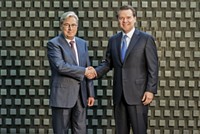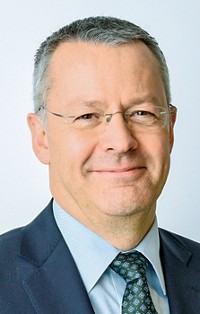Advertisement
Grab your lab coat. Let's get started
Welcome!
Welcome!
Create an account below to get 6 C&EN articles per month, receive newsletters and more - all free.
It seems this is your first time logging in online. Please enter the following information to continue.
As an ACS member you automatically get access to this site. All we need is few more details to create your reading experience.
Not you? Sign in with a different account.
Not you? Sign in with a different account.
ERROR 1
ERROR 1
ERROR 2
ERROR 2
ERROR 2
ERROR 2
ERROR 2
Password and Confirm password must match.
If you have an ACS member number, please enter it here so we can link this account to your membership. (optional)
ERROR 2
ACS values your privacy. By submitting your information, you are gaining access to C&EN and subscribing to our weekly newsletter. We use the information you provide to make your reading experience better, and we will never sell your data to third party members.
Business
BASF Will Acquire Ciba
Deal worth $5.5 billion will advance BASF's quest for specialty chemical operations
by Patricia Short and Michael McCoy
September 16, 2008
Ciba, the beleaguered Swiss specialty chemical maker, has agreed to be acquired by BASF., the world's largest chemical company. The sale, for about $5.5 billion including debt and pension obligations, will end a standoff between Ciba and investors over the future of the company and its chairman, Armin Meyer (C&EN, Sept. 15, page 8.)
BASF, which is in a drive to build its specialty chemical business, has offered 50 Swiss francs—roughly $44.75—for each Ciba share. That's a 32% premium over the company's closing price on Friday, Sept. 12, the day before the deal was announced, and a 64% premium above its average share price over the previous 60 days.
Not every Ciba investor is happy with the deal. Bestinver, a Spanish asset management company that owns 13.2% of Ciba, is rejecting the offer as too low. Bestinver says it has "no intention to tender the shares at the current offered price."
BASF Chairman Jürgen Hambrecht told securities analysts in a conference call that his company arrived at the price after a month of intense discussions with Ciba's board and that it is "our last, best, and final offer."
Price aside, Hambrecht said there was "convincing strategic logic" to the deal. "With the acquisition of Ciba, we are strengthening our portfolio and expanding our leading position in specialty chemicals," he said. Ciba's sales in 2007 were $5.4 billion, split roughly equally among three businesses: water and paper treatment, plastics additives, and coatings effects.
BASF executives said the combination of BASF and Ciba activities will create a number one or two global player in all three businesses. Of these, paper chemicals faces the most challenging environment, and Ciba was already in the midst of a cost-cutting program. After the acquisition, Hambrecht said, "BASF will take decisive and fast steps to reposition and restructure the business to adapt it to changing market conditions."
Hambrecht told analysts that the acquisition will remove an atmosphere of uncertainty around Ciba, which has undergone a series of corporate restructurings and experienced a steady decline in its stock price. "We recognize the strength of broad areas of Ciba's portfolio, even if the company's performance has disappointed analysts and investors, especially in the second quarter of 2008," he said.
Hambrecht would not provide cost savings estimates, but Oliver Schwarz, an analyst with the European stock research firm Equinet, estimates annual savings of as much as $400 million. In a note to clients, Schwarz said he sees the deal as an attractive expansion of BASF's specialty chemical business. An exception is paper chemicals. Although BASF claims synergies, Schwarz doesn't see this business as a good fit and considers it a candidate for divestment.
Hambrecht tried to allay fears among Ciba's 13,000 employees by promising to establish a global operating division at Ciba headquarters in Basel, Switzerland, and to support the R&D site there. BASF will continue to run the Swiss production sites in Klybeck, Monthey, Kaisten, and Schweizerhalle for at least 18 months. And it will use "Ciba" as a brand name for certain products and activities.
Accepting the BASF offer was not a question of "giving up," Meyer said at the analysts' conference. "We compared a future on our own with increasing risks," he said, pointing specifically to the company's increased vulnerability amid huge swings in raw material prices. "We are sandwiched between larger suppliers and larger customers, and it is getting worse and worse."
Moreover, Meyer added, the consolidation wave rippling through the chemical industry has only just begun. "Our portfolio, our technology, and our global dimensions are very strong, but we had to reduce the risks. Looking at our way forward alone or with BASF, we think this is an excellent fit with a fair price."






Join the conversation
Contact the reporter
Submit a Letter to the Editor for publication
Engage with us on Twitter